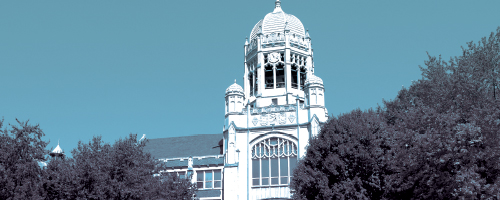As the new president of Muhlenberg College, I am asked frequently whether a liberal arts education is still relevant in this technological age. After all, doesn’t the future belong solely to those who pursue the “STEM” (Science, Technology, Engineering, and Math) disciplines?
First, many forget that the natural sciences and math – literally, the alpha and omega of STEM – are core elements of a liberal arts education. Indeed, Muhlenberg’s outstanding programs in biology, biochemistry, neuroscience, math and computer science provide excellent preparation for students interested in careers in biotechnology and other high-tech fields.
Even more importantly, our students are preparing for leadership roles within the new, Creative Economy, where ideas are the coin of the realm. They realize the future will value those who can bring new and innovative ideas – including disruptive new business models – to the table most effectively, and see them through to effective implementation.
For this sort of value-creation, the most important skills are integrative and creative thinking spanning multiple domains of knowledge, coupled with the ability to formulate cogent arguments and communicate clearly and compellingly. Don’t look now, but these are the skills our students at Muhlenberg are learning today. In fact, by blending art and science, today’s Muhlenberg students are forging new alloys that will shape and form the future. The large majority of our students double major, and in new and innovative combinations; say, in theatre and neuroscience, or dance and biochemistry. In fact, one of our professors recently remarked, “Some of our best pre-med students are dance majors!”
To quote Wayne Gretzky, today’s students must skate to where the puck is going to be, not where it is today. When our current first-year students were born, Google didn’t exist, and Siri wasn’t even a gleam in Apple’s eye. By the time they are 30 years old, they will very likely be working on products, processes, and technologies that are unknown today.
Speaking of Apple, its co-founder and legendary CEO, the late Steve Jobs, went to a liberal arts college – Reed College in Oregon. In fact, if Jobs had not taken a course in calligraphy and, thereby, developed a deep aesthetic sensibility, the world might be a very different place today, filled with far fewer beautifully-designed products, and we might still be listening to vinyl record albums purchased in retail stores and played on turntables.
I left a successful career in business and strategy consulting in Boston to come to Muhlenberg because I saw an unparalleled opportunity to play a key, leadership role in an institution with a history of over 166 years of helping students prepare to make their marks on the world.
Muhlenberg College was founded back in the mid-Nineteenth Century on the idea that education is more than a foundation for learning. Rather, we have always believed that expanding one’s goals and exceeding one’s potential is a basic and necessary prerequisite for life-readiness. At Muhlenberg, this philosophy extends to mid-career learners in our Wescoe School, one of the oldest and finest schools of continuing education in the U.S.
Together, our community is committed to an ethos of reaching higher; guiding and driving students of extraordinary promise to reach above and beyond their given talents, skills, and objectives to achieve prominence and effect change in whatever professions, interests, and causes they choose to pursue. Are the liberal arts relevant for the careers of the future? You bet!






















